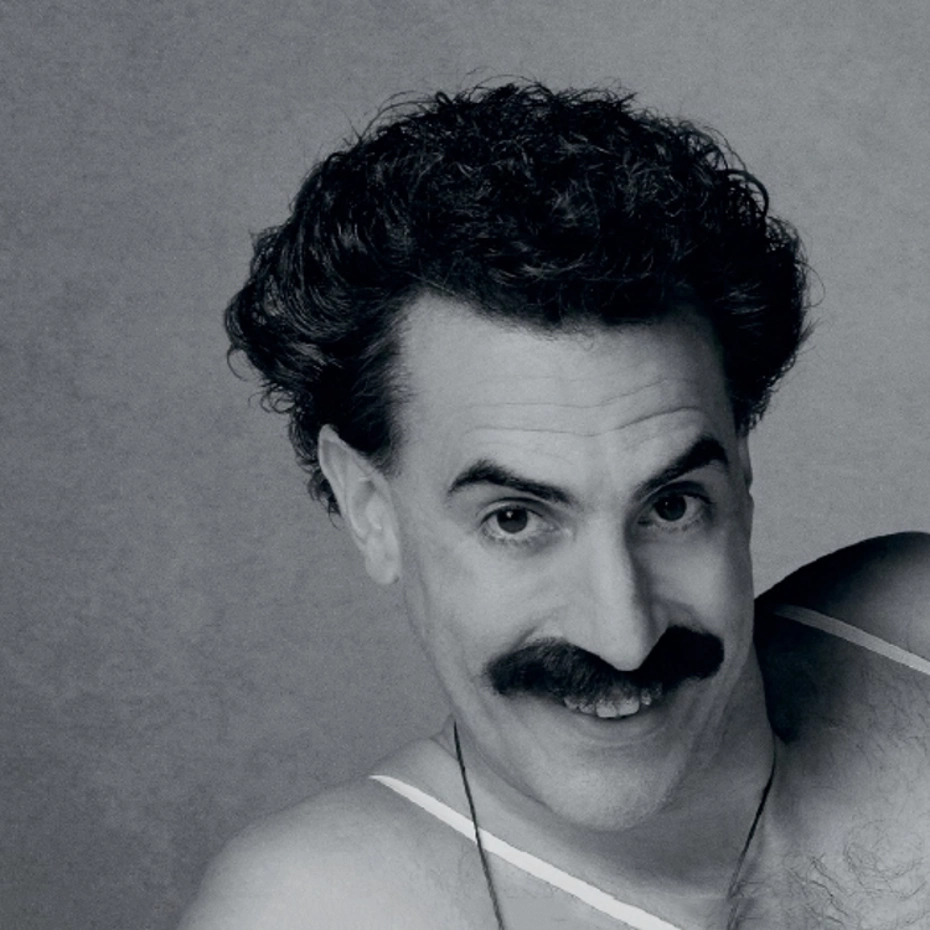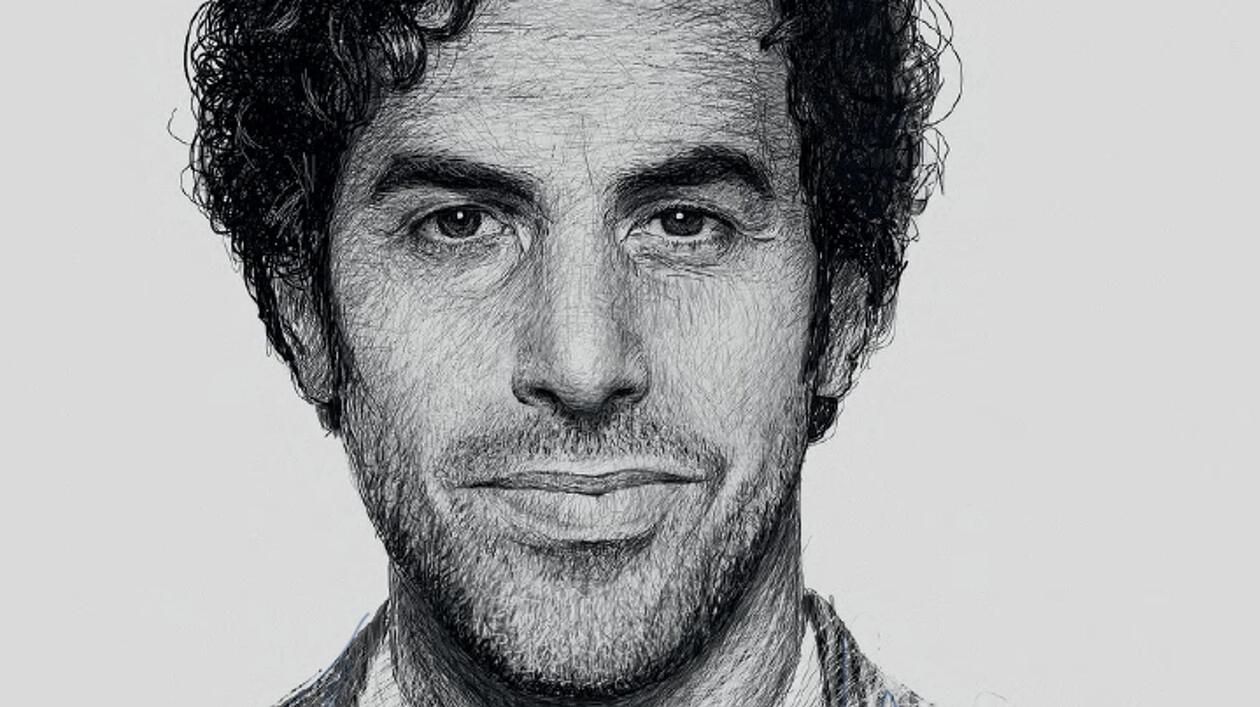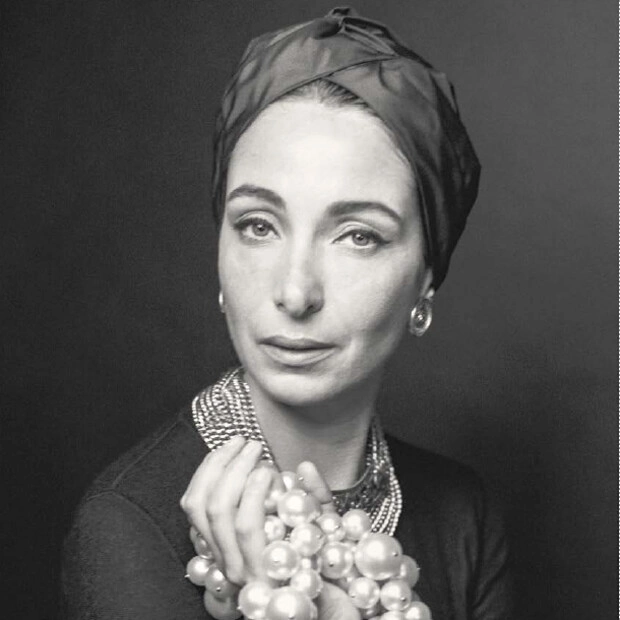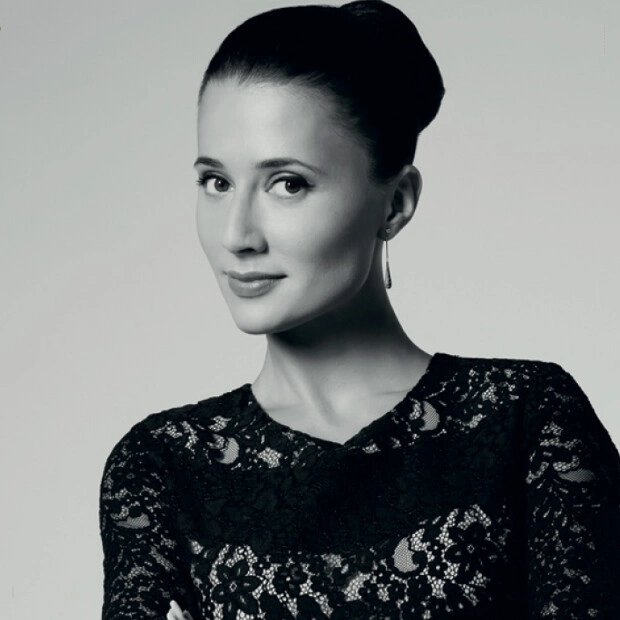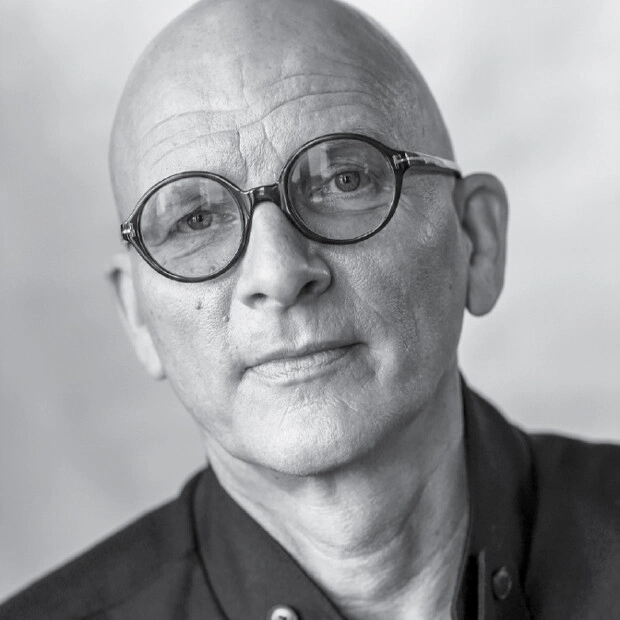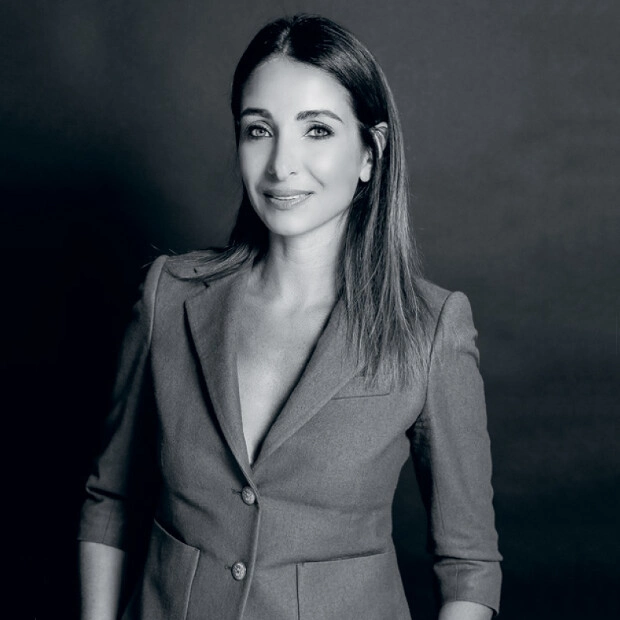Interview — Nellee Holmes
October 21, 2020
Via Zoom
Borat: Subsequent Moviefilm — Delivery of Prodigious Bribe to American Regime for Make Benefit Once Glorious Nation of Kazakhstan
Amazon Prime
The Trial of the Chicago 7
Netflix
Nellee Holmes. We’re living in tough times in a strange world, and Borat proves it. What do you do in your personal and professional lives to improve your wellness and avoid bad vibes? How would you advise us to manage our emotions and mindsets?
Sacha Baron Cohen. I don’t think I am the person to advise anyone on managing anything. Well, I’m friendly with a surfer, who specializes in big waves, and once, he gave me an excellent bit of advice, which is, when you are stressed, to breathe in and out through your nose. Several times in the movie, I was quite stressed, and found it a good way to lower my heart rate. So, it’s all about breathing. (Laughs)
N.H. You use your chance to raise your voice on political, racial, and other issues. Do you have a hope that, with all the current public movements, the on-going pandemic, and everything else happening now, human society is undergoing a reset so needed to become better than it has been before?
S.B.C. It’s hard to say. Firstly, I’m a comedian, an actor, but not a philosopher or an academic. I wish that, as a society, we would listen to academics and experts rather than to demagogues. As someone who’s had some fame, I’m reluctant to espouse any views. I do think we’re about to face increasingly hard times as more and more people will be dying from COVID 19. A lot of this grief is obviously due to politicians’ refusing to listen to experts. Will any good come out of this awful period that has beset humanity? I hope so, but there will be so much more suffering and so many more deaths that I cannot feel sure of it. On top of everything, the coming election is so uncertain that America may end up in a far worse situation than now, depending on its results. So, it’s hard for me to feel optimistic at the moment.
N.H. Borat shows hatred, bigotry, and other deeply rooted evil attitudes man had always had before social media appeared. You’ve been very critical of social media, Silicon Valley, and what they all have been doing to us. Do you think there’s nothing we can do about it? What, do you think, must happen, or how must Silicon Valley change?
S.B.C. Well, in essence, very few people control the information billions all over the world receive. That is unfair and undemocratic as those people aren’t voted for, cannot be replaced, and aren’t accountable for what they do. What we’re witnessing is a technological revolution far more impactful than the Industrial Revolution once was. Back then, there were decades for governments to catch up with the changes brought about, such as urbanization, crime, child abuse, and prostitution. It took governments many years to introduce legislation curbing the excesses of the industrialists that were at the forefront of the changes. As to the current technological revolution, first, everyone assumed it would be all positive. Now, we’ve realized it has some very negative effects too. The governments around the world are trying to catch up, but it will take legislators quite a while to make a real change, which I believe has to happen. Regarding social media, I would say they have done more to change for the better in the past few weeks than in the past few years. A lot of that is down to a wonderful movie called Stop Hate for Profit, so, I would say there is hope.
N.H. What did you want to achieve through Borat and the sequel?
S.B.C. This time, my purpose was to have the sequel released before the election. Ever since Trump became President, I have been deeply concerned about his undermining our democratic institutions and incremental sliding towards autocracy. I am worried about the upcoming election and fear that even if Trump loses, he may try to stay in power. So, this movie was meant to become both the second funniest movie after the first Borat and a warning of the dangerous slide into autocracy away from the wonderful ideals of American democracy.
N.H. My congratulations! I think it’s an amazing film and very prescient, just like Borat. Let’s talk about Abbie Hoffman. Did you know anything about him beforehand?
S.B.C. It was quite incredible. While playing Abbie Hoffman, famous as I was, I never spoke about any political issues in public, even though I did feel very passionate about politics and could not help letting it come out in my work. Once, I gave a speech at the Anti-Defamation League about the dangers of conspiracy theories, lies, and hate spread via the Internet. It was interesting as it almost mirrored what was going on with me playing Abbie Hoffman in his court appearance. That was the time for him to stop clowning, being a prankster, and to express his political opinions clearly. That trial was unjust, so I felt a real connection with Abbie. I read his books, listened to his speeches, and tried to emulate his accent. The thing is, I had known about Abbie Hoffman for many years. The topic of my undergraduate thesis was the role of Jews in the Black Civil Rights Movement during the1960s. Abbie was one of the radical Jewish students supporting the movement in the southern United States and got involved with the Student Nonviolent Coordinating Committee (SNCC). When I was 20, the head of that organization, a man called Bob Moses, gave me one of his rare interviews. Talking about The Spy last year, I mentioned that my late father had been fascinated by Eli Cohen and had a book about him. A while ago, I found out that Dad had had a book about Abbie Hoffman too. So, my father respected those two men, and I grew up with books about them on a bookshelf in our house. This is my connection with the story of Abbie Hoffman.
N.H. How did you feel crashing the CPAC? Was your heart pounding? Giuliani says it was a fabrication. Could you say if there have been attempts to prevent this episode from getting into the film? Have you had any interaction with Giuliani or his people? Could you say anything else about all that?
S.B.C. Well, I would say Giuliani was definitely concerned enough about the incident to call the police and have them raid and search my hotel room afterwards, which, generally, cannot be done without a warrant. I have no idea what he told them, but they did just that.
N.H. Did he know it was you?
S.B.C. I let him speak for himself in the interviews he’s been giving. In regards to the CPAC thing, it was quite a challenge because the Vice-President was scheduled to speak. His security level is the same as the President’s, so I decided to infiltrate CPAC as a Donald Trump lookalike. For that, I had to wear a 54-inch fat suit and a fake head. It was quite terrifying because there was the highest 3rd level TSA security check to go through. I had made sure there were no wires or anything else in the fat suit that could set off a metal detector, but when a TSA officer put one over my chest, it beeped. I was asked what I had on me. I said it was a pacemaker. The officer started wanding me from top to toe. When he got down to my belly, the detector gave another beep. The man asked me what was there, and I didn't know what to say. You know, having a pacemaker near the heart is OK, but what on earth could be near the belly? There was an awkward silence. Then he looked at me and asked if that was the wire for the pacemaker. Relieved, I said yes, that was it, and he let me go. I went away and hid in a bathroom for five hours, listening to the sounds various conservative men made while answering nature calls.
Finally, I was apprehended by the secret service and soon found myself surrounded by agents, police officers of all kinds, and event security men. The main thing for me was to keep my incognito since if I had got identified and the media had learnt about my appearance at CPAC, it would have been too big a story. So, I tried to prevent all those officers from getting my ID for as long as possible. At one point, there were about 12 of them around me, demanding to see my ID. Trying to stall them as long as I could, I asked them to verify they were indeed law enforcement officers by showing their IDs first. One of them pointed to a massive badge on a string around his neck and asked if I was satisfied. I wondered how I was to know it was a real ID and suchlike. Well, they kept on asking for my ID, and I finally said it was in my shoe. They did not want to mess with my footwear and let me be for a while. Soon, a superior supervising officer showed up and ordered his men to get my ID, no matter where it was, but they never got it anyway. (Laughs)
N.H. You’ve managed to pull off so many unbelievable tricks, which were, no doubt, all carefully planned and prepared. You certainly don’t have to give away all your secrets, but could you say something about how things like living with two ultra-conservatives are usually arranged? How do you find and contact such people? How do you set up everything?
S.B.C. Well, this was the most challenging movie I’d ever made. On the one hand, Borat was my world-famous character. On the other, I wanted real people to be in the new movie. So at first, it seemed just impossible. Then two years ago, I was invited to do something with Kanye West on Midterm Elections Day at Jimmy Kimmel’s Show. The plan was to do a sketch in which Kanye and I would pretend to have been preparing his infiltrating the White House and Donald Trump, which included wearing the MAGA caps and things like that. When I called Kanye, he said he wanted to get the approval of the President, which, of course, was not possible. So, I had to come up with a new sketch for Jimmy Kimmel in a real rush. I asked a friend of mine, Chris Rock, for advice, and he suggested doing Borat. Well, I hadn’t played the character for 12 years and was going to shoot a sequel later, but Chris insisted I go ahead and do it. So, in the mad panic of that night, I managed to find a costume, a fake mustache, get some field producers to interview people, and contact the original Borat writing team. The next day, we met and went out to film the thing. At the end of the day, I realized Borat was the perfect character for mocking Trump, being his slightly more extreme version. They are both misogynists and racists. Both support anti-Semites, could not care less about democracy, and hold outdated views. On top of everything, both of them are very laughable characters. What the President and some of his supporters say publicly is often very extreme. I was wondering how to satirize that. Talking to some Trump supporters in the disguise of Borat, I realized that with his help, I could get them to reveal how much further they were willing to go. So, at that gun rally in Washington State, I got that crowd to agree to slice up journalists in the Saudi manner. I wanted to emphasize America’s approaching the edge of democracy beyond which is falling into the abyss of autocracy, which will entail fighting free speech, attacking journalists not only verbally but physically as well, and even imprisoning people challenging the regime. As a member of a journalistic association, I know that your colleagues are often threatened nowadays, so I brought out my own fake news journalist to make America and the world laugh while preparing to face the danger of the next few weeks.
N.H. You know, I found Borat so astounding that I even somehow cut my mouth, covering it while watching the film. I can’t but wonder how you feel and what’s your adrenaline level at the end of the day. Are you amazed at your ability to do things like the women’s clinic and the debutante ball? How do you manage to do all that and get away with it? Where are the cameras located?
S.B.C. Well, the cameras are almost always visible, as people we work with want to be on television. In terms of the adrenaline, those days were just exhausting. I would get up at four or five in the morning, and the shooting day over, I would do a lot of writing and producing. So, for a year, I had to survive on four or five hours’ sleep a day, facing the usual actors’ challenges of preparing to play my character, remembering my lines - a lot more than in any other movie - and being fully prepared for any question anyone might have asked me. An actor usually learns two or three pages of text a day. To play Borat, I had to memorize up to a hundred pages of dialogue within one day. The character himself must be made fully three-dimensional with no chinks in the armor so nobody could realize he is a fake. That means my preparation was from knowing everything about the mythical Kazakhstan we had made up to knowing everything about Borat’s family, friends, acquaintances, and each member of this imaginary country’s government. I also made sure my smell was abhorrent enough for everyone around to know they were in the presence of somebody from a different civilization. Hard indeed was it to be around me – so repulsive was the stench. (Laughs) Besides, everything on me, down to the underwear, was authentic. Everything in my wallet and pockets at any point would be completely consistent in keeping with the character as my idea is creating a fully believable character impossible to expose. I must say it was the hardest ever acting challenge for me. In one scene, I stayed in character for about 125 hours in a row. I even slept as Borat in Borat’s pajamas sharing a house with those two men. I realized that to get to know them, reveal their humanity, have the movie progress, and get the needed plot points, I would have to remain Borat for five days non-stop, in a variety of situations and locations, like that gun rally I went to with them in the end. I think it was the longest and deepest immersion in the character I had ever experienced. I remember on the second night, after locking my bedroom door, I kept on walking around the room in Borat’s clumsy manner looking for my toothbrush. After about ten minutes, having found no toothbrush, I suddenly realized I was still being Borat. I could not get out of the character even being all by myself. So, I had to remind myself who I really was.
N.H. Speaking of tyrants like Borat and Trump, do you think it’s just a strange coincidence that such like-minded leaders as Bolsonaro in Brazil, Maduro in Venezuela, Kim Jong Un in North Korea, or the one in the Philippines, depicted in the first part of Borat, got into power, and all of them disclaim any criticism of their actions as fake news?
S.B.C. Donald Trump was brought into power by fake news stories that persuaded the Americans to vote for him in the first place. It’s been his brilliant move and an Orwellian stroke of genius to co-opt, control, and use this very phrase against legitimate journalists. He’s been using the famous rule of propaganda to repeat a lie again and again until it becomes ingrained into people’s psyches, so eventually, they start dismissing the truth as fake news. Once again, I’m a comedian, an actor, and a writer. I’m neither a political philosopher nor an academic, even though I once almost did a Ph.D. in history. Nevertheless, I would like to say two things. Firstly, America is still the most influential country and democracy in the world, so when an authoritarian leader or demagogue is elected here, it has ripple effects internationally, giving similar demagogues a better chance to be elected in other countries. Secondly, I do believe this trend of demagogues taking power is not coincidental but correlated with the changes the Internet wrought in social media. Democracy relies on shared truths, while autocracies rely on shared lies. Social media have become the most effective propaganda machine in history, being ideally suited to spread those lies far and wide, far wider and far faster than truths can go. So, democratic leaders are always at a disadvantage because the truth is never exciting but often too dull to be click-bait. The on-going technological revolution is controlled by a handful of people not interested in preserving democracy. As a result, over the last five years, we’ve seen seemingly illogical votes when the populus voted against their own interests. Political analysts find it very surprising. I think there’s a symbiotic relationship between social media and autocratic leaders. The next few weeks will determine whether the U.S. remains a democracy or slips into autocracy. I do believe we all must raise our voices against it. I am a comedian and a film-maker, and my form of protest is releasing my movie now. This is the only way of standing for democracy I have.
N.H. Abbie Hoffman is both a treasured and tragic figure. His end was tragic, no doubt. That’s what I realized reading about him. How do you explain that?
S.B.C. He was a very complicated, contradictory, and incredibly charismatic person. He had this intuitive understanding of how to play both in a crowd and in a courtroom. He was also ready to risk his life to improve society. That’s what I found most chilling watching that news conference, at which he was so hilarious, joking with the reporters all the time. At one point, he was asked what he was prepared to sacrifice. He said, “My life”. That was the price he would pay if necessary. When researching him, I had a voice coach I’d met on Martin Scorsese's Hugo - the legendary Tim Monich. Over the last 60 years, he’s done all the incredible voice coaching work for Tarantino, Scorsese, and many others. I wanted to make sure my “Abbie Hoffman accent” was perfect. It's complicated enough containing Bostonian and Californian flavours as Abbie was educated at Brandeis and Berkeley. I listened carefully to his voice, its rhythm and tone before and after his imprisonment. I was saddened to hear the sound of a broken man on the radio show he did after his release. I don't know what happened to him in prison. I could just hear his confident personality crumbling, especially on the first couple of nights, when he spoke about the horrifying conditions he had experienced. It is, indeed, a tragic story.
He used to be a real inspiration. I was particularly impressed by those seemingly absurd stunts of his, which, no doubt, were meant to achieve certain political effects. He reminded me of a drama form called the buffoonery, a medieval form of comedy, once a year performed by dispossessed outcasts, often living outside settlements, when they were allowed into villages and towns. In their shows, they would mock those in power. So, it was an early and often quite harsh form of political satire. In my view, Abbie acted just like a buffoon.
